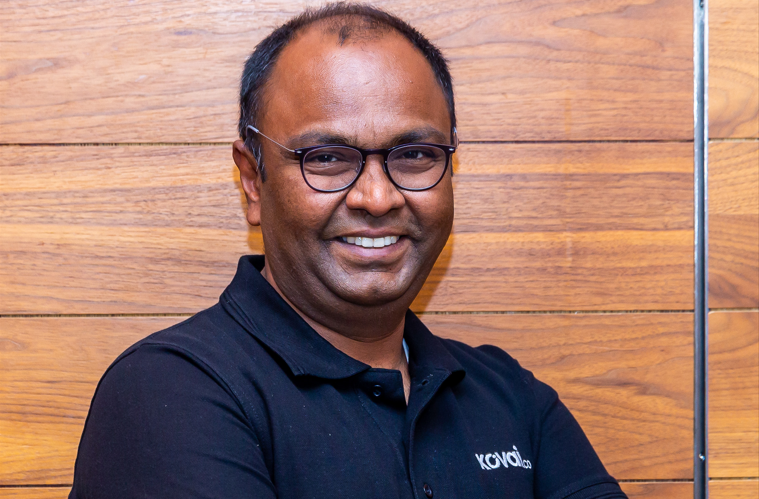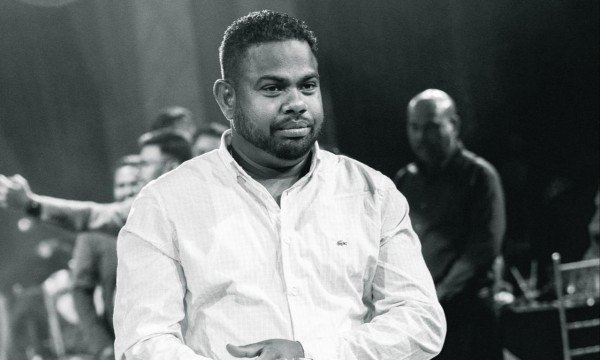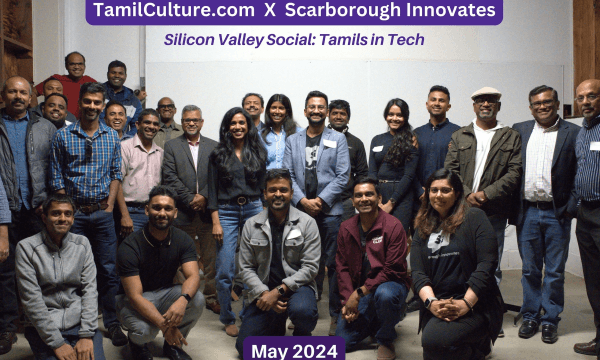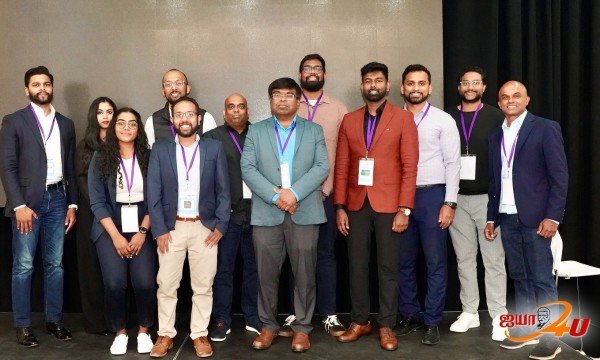
___
***Are you or someone you know in the global Tamil community doing great things? We'd love to feature them: FILL OUT THIS FORM ***
Network & collaborate with Tamil Changemakers from around the world. Request to join our private LinkedIn community here.
___
How did you get the idea to start Kovai.co? What was the first product you launched?
As a consultant for 10 years, I identified gaps that customers were facing on administering, operating, and monitoring their Microsoft BizTalk environments. Specifically, I saw that the default tooling lacked some enterprise qualities like security, auditing, analytics, and monitoring capabilities. It also demanded a high level of BizTalk knowledge to perform very basic activities.
Most of the customers ended up building their own custom management and monitoring solutions. Seeing this first-hand, I took it up mainly as a passion, to fix those gaps by building a product called BizTalk360 which offered generic management, monitoring, and analytics solutions for the BizTalk Server.
The initial product idea for BizTalk360 was seeded at the Microsoft Global MVP Summit in Seattle in February 2010. The first version of the product was very well received by MVPs in 2011, which led to me to officially launch the start-up the same year. Within a year, we onboarded 65 customers.
What is the story behind the company name Kovai?
I was born and raised in a tier 2 city - Coimbatore, in South India and had never travelled anywhere before taking up my first job abroad in London. Coimbatore used to be called Kovai during the pre-independence era. After considering a lot of names, I decided to keep it short & simple and name my company Kovai.co, which also reflected my affinity with my hometown.
Why did you decide to set up a development centre in Coimbatore (India) versus Chennai or Hyderabad?
Throughout my years in India, I had never lived anywhere else but Coimbatore. So, when I decided to set up a development centre in India, most people advised me to do it in Chennai, Bangalore, or Hyderabad, where software companies were already aplenty, and it had great talent.
At that point, I needed just 20 talented people and was sure I could find them in Coimbatore, a city I knew and had help from family and friends. I also didn’t want to complicate matters by setting up an office in a city I never knew. It was also a way for me to give back to my hometown, by providing economic opportunities to some talented people there.

In this day and age, the focus seems to be about speed and getting results today. You mention that you have a long-term approach to building products, and it helps that you are bootstrapped (vs having raised money). What made you decide to bootstrap?
Decision to bootstrap vs raise money should depend upon the nature of the business and the product you are dealing with. Acclaimed business theorists, W. Chan Kim and Renée Mauborgne has coined 2 terms to classify all market strategies— Red Ocean and Blue Ocean. Red Ocean refers to when there are a lot of competitors, and you need a substantial amount of money to survive. Whereas Blue Ocean refers to a very niche market wherein you might see a lower growth rate but survive with considerably low investment.
For example, our first product, BizTalk360 falls within Blue Ocean (no competitors, focused segment, and low customer acquisition cost) while our latest product, Document360, falls under the Red Ocean strategy as we were competing against major industry players.
As a bootstrapped company, focus is very important. Your company currently manages 5 product lines. How did you decide that these would be the 5 products that would be the best fit for the company to develop, grow and manage?
All our products in the company were built around the same principle of solving real business problems. Also, without understanding the problem, there is no way anyone can provide a clear solution.
For each of our product, we understand the pain-points and that’s the reason our solution is fool-proof and scalable. Our first product, BizTalk360- one of the key problems identified was that our clients would implement the systems using the BizTalk server and it sits right at the heart of the company because a lot of systems connected to it, and they cannot afford them to go down. They wanted to monitor it and there was no monitoring solution available to monitor their health.
Similarly, our product Serverless360 also focused on solving customer pain-points. As cloud technologies were getting prominent, we decided to manage a build-up cloud monitoring product for managing Azure resources. Our Microsoft expertise was an added advantage.
As far as our 3rd product, Atomic Scope, it is a by-product of BizTalk360. It offers monitoring for hybrid integration services.
Next product was Document360 - which is currently the fastest growing product in the company.
The idea came while we were looking for a solution to our own documentation challenges for our products. I spent all my spare time researching on the tools & products available in the market and started documenting everything — things like what I like about certain products, what are the gaps in those products, pricing structure. I even spoke with our own documentation team members understanding their day-to-day challenges and so on. While we were able to narrow down on to a specific tool for our documentation requirement, after all the research, it gave me the confidence that there is room for a good documentation focused product for software products and projects, taking into consideration some of the requirements we had.
With our latest product Churn360, we are helping businesses predict customer health thereby reducing churn. The product is an AI-based customer success platform to prevent customer dropouts, again another pain-point we wanted to address from a very long time.
_____________________________
Related Articles:
- The Tamil Creator Podcast (EP #74): Sibi Selvanathan - Writing & Publishing An Amazon Top 5 Epic Fantasy Book In 18 Months During The Pandemic
- The Tamil Creator Podcast (EP #73): Tia Bhuva - Founder Of Successful E-Commerce Brand (TiaBhuva.com) & Creator Of The "Saree Silhouette"
- The Tamil Creator Podcast (EP #72): Bhi Bhiman - St. Louis Native & Musician On His Journey Including New Album "I'll Sleep When I'm Famous"
- The Tamil Creator Podcast (EP #71): Tanya Selvaratnam - Emmy-Nominated Producer, Writer, Abuse Survivor & Social Justice Champion
- The Tamil Creator Podcast (EP #70): Prakash Chandran - Co-Founder & CEO of Xano, Fastest No Code Backend Development Platform
- The Tamil Creator Podcast (EP #69): Apiramy Jeyarajah - Creating & Embracing Change As The Head of UK Wholesale At Aviva Investors
- The Tamil Creator Podcast (EP #68): Tharshan Rajendiram - Co-Creator Of The "Basement Reels" YouTube Channel (80,000+ Subscribers)
- The Tamil Creator Podcast (EP #67): Rathika Sitsabaiesan - From Politician (Canada's 1st Tamil MP) to Professor
- The Tamil Creator Podcast (EP #66): Dunstan Peter - On Launching Trinity Tech, A Multi-Million Dollar Business
- "These Tamil Entrepreneurs Share How They Grew Their Side Hustles"
_____________________________
You started this company over 10 years ago and are still running it actively today. This is quite unusual in the tech world, where founders don’t stay active within a company they started for this long. How do you continue to stay motivated and passionate about your business?
I was always passionate about computers and solving problems from a very young age. I am a purely technical guy, who loves building software solutions to solve real business problems. That was how I began working on my first product, BizTalk360, and started Kovai.co. I remain extremely passionate about building products, I still write code for products and own a lot of the legacy stuff in the company. In fact, on days when my tasks and responsibilities seem overwhelming, I take an hour or two and spend it on a product.
Through my journey of starting and running Kovai.co, I also realized, when it comes to entrepreneurship, I am extremely patient and persistent, which is why I am actively involved in the day-to-day running and charting its growth plan.
How did you go about getting your first group of paying customers for your products? Do you focus more on building sales teams to drive demand or marketing (ie. SEO, paid marketing, etc.) to drive awareness to get leads?
For me, selling the product was the tricky part as I didn’t have much experience doing that. I started blogging very early in my career. The blog used to be very technical in nature as I specialized in a particular domain which is the BizTalk server and gradually, I was able to build an audience of 15,000 followers.
When I developed BizTalk360, the blogs helped me get my first customer (a casino) all the way from Hong Kong, which was completely unknown to me until that point. While my blogging activities might’ve landed us the first customers, it was the value of the product itself that kept customers loyal.
Running a business, especially a growing successful one, can be very demanding on your time & energy. How do you make sure you have enough for your obligations outside of work (ie. family, friends, health, etc.)?
At the end of the day, running a business is a marathon and not a sprint, hence you need to balance everything out. Sunday is a complete off-day for me, on other days no work after 7 pm, regular exercises, good time with friends, etc. You need to be disciplined in everything you do, that includes your personal time as well.
How did you think your childhood, or your formative teenage years play a part in you becoming an entrepreneur?
As a kid, I used to help my father at his store which he used to run. My dad used to take me there frequently. I used to observe and experience what it is to be like running a business then. Now, when I look at it, I see the only difference being the magnitude with everything else being the same. I was always passionate about computers - I used to develop small programs for training centres, gas agencies, etc. Being an average student in academics, I managed to score well in computers, so I realize this has greatly influenced my career decisions and subsequently solving real business problems.
What’s been a failure (or “learning lesson”) you’ve experienced in the last 3-5 years and what did you learn from it?
I used to take advice from a lot of people for everything. For example, if there is a problem with an employee, I would immediately call one of my advisers for a chat and blindly follow their advice, resulting in me losing an early employee unnecessarily. I came to realize the advice is only great if the person giving it understands all the context. I also realized that it is best to follow your hunches and intuition as well.
Where do you see yourself in the next 3 years?
We aim to have crossed $30 million in recurring revenue by 2025 and there by working towards our larger goal in front of us, which is to be a SaaS unicorn by 2030.
What role has your family & friends played in the choices that you’ve made in your life so far? Did anyone question your decision to focus on this business full-time?
When I was working at Fidelity Investments, I started working on this part-time. Solving real business problems & giving back to the community were all part of my decision to do this. However, I never jumped the gun and was very frugal in my whole approach. I was working at my home office on weekends when I first started. Once I finished building the solution, I showcased it to the MVP community and got positive feedback from them. That’s when I decided to launch the product officially. It was only after I got my initial 30+ customers, I thought about scaling and eventually moved full-time in entrepreneurship. Since it was a very profitable business right from beginning and I was working on my passion, my family and friends were supportive throughout.
What do you do outside of work for fun?
I love cars and like going for long drives whenever I get a chance. I travel extensively for work and pleasure. Also, I am a hard-core Formula 1 fan. I would catch up on races when I am free. I recently took my kids to Disneyland Paris and that was a fun experience.
In terms of your personal legacy, in a few sentences, describe how you want to be remembered by your family and friends?
I am a techie, and I am very passionate about technology and the latest trends. I have built and launched several products while scaling my business. I have given back to the community in terms of expanding the business in Coimbatore and generating employment there. My principle is I generate wealth and has helped generate wealth for my colleagues too. I want people to remember me as an entrepreneur who has generated employment for similarly passionate people.
What do you think you would tell 16-year Saravana looking back?
Challenges are never permanent. Every problem you encounter in life will subside over time. As an entrepreneur, the most important quality you need to possess is patience. I would probably give reassurance to my younger self that things will always bounce back for good. There is no overnight success but if you are persistent and patient enough to wait along with doing the best you can, then eventually everything will turn out well.
What is your favourite book(s) you’ve read recently and why?
“The Founders Mentality” by Chris Zook and James Allen. It’s a fantastic book, it share invaluable insights as to how to preserve a company’s founding purpose and energy as you scale. It shows the importance of keeping the culture as you scale at speed.
What is a new belief, behaviour or habit that has most improved your life?
The routine of rising early. Starting your day ahead of others helps you to be efficient in your daily tasks. They say necessity is the mother of invention and I completely agree with it. Waking up early was a task earlier but now it has become a habit. The uninterrupted hours I get in the morning is the time where I feel most productive.
What is something that you've splurged on recently in the last year that you have zero regret about?
Not anything recently, however in 2004, with all my credit cards + some savings I bought a BMW Z4 (again a two-seater) for £25,000. The second production car in the series was made by BMW. If that money was invested in a land/house in India/UK that time, it would have roughly been worth 10-15 times now. But I have no regrets, I loved every journey I have made in that car all the way up to the tip of Scotland and many little islands surrounding the UK – Isle of Man, Isle of Wight, etc.
How has the UK Tamil community impacted you both personally and professionally?
When you are away from your home, you tend to find a new community. I moved to UK when I was 22 years old leaving behind everything I have built in India. It’s like moving from high school to college, you need to recreate everything, but typically those people will become your lifelong friends (well-wishers). That’s exactly what happened to me, I have a core set of people where we went through everything together (started off as bachelors, got married, now with kids and are close family friends).
It's very important to have this community of friends when you are away to support you in each aspect whether personal or professional.
What is your favourite Tamil food (meal or dessert)?
Idly/Dosa/Sambar.
What is your favourite Tamil movie?
Anbe Sivam.
**Looking to create your love story? Join the other couples who have dated and married through myTamilDate.com!**
"myTamilDate Success Story: It Was Love At First Sight For Madhu & Niya"
"myTamilDate Love Story: Jenani & Nav Found Each Other At The Right Time And Right Place In Life"
"myTamilDate.com Love Story: Tharshi & Ravi Found Love During Lockdown"
"How France Met Canada: A MyTamilDate.com Love Story"
***CLICK HERE to listen to us on Spotify!***
Related Articles:
- Tamil Innovators: Thanuska Subramaniam on Finding Success in the Creator Economy
- Tamil Innovators: Prajeeth Balasubramaniam Discusses Startups & Investing in Sri Lanka
- Tamil Innovators Spotlight: Nivatha Balendra On Surviving Cancer & Building a CleanTech Startup
- Separated From Family During Sri Lanka's Civil War, Ganesh Thava Overcomes Childhood Adversities To Find Success As Actor, Writer & Director
- Singaporean-Born, Canadian-Raised, Decolonial Racial Equity Educator Channdika Thayver Delivers Powerful TEDx Talk On Racial Equity In The Workplace
- "Tamil Innovators Spotlight: Theban Ganesh Discusses Building a Web3 Company, Improving Healthcare Through Blockchain, Successful Exits"
- "Karthy Subramaniam Co-founded Fast Growing Sauce Company LITS as a Tribute to a Childhood Friend"
- "Elite Athlete, Coach, Future Chiropractor & Entrepreneur Abirami Shanmugaratnam Is Making Waves In The Athletic Performance Industry"
- "Toronto's OG Food Writer Suresh Doss Is Using His Reach And Voice To Help Engineer A Comeback For Beleaguered Restaurant Industry"
- "Ballet And Kung Fu Trained Australian Actress & Writer Rubi Balasingam Is Promoting Tamil Voices In Aussie TV And Film"
- "Yathusha Kulenthiran's Marketplace For Environmentally Sustainable Palmyra Products Empowers Female Artisans In Sri Lanka"
- "Australian-Tamil Entrepreneur Sujan Selven Is Creating Economic Opportunities For Remote Villages In Northeast Sri Lanka Using Upcycled Devices & Improved Connectivity"
- "Crypto Tinhorn & Former Journalist Anand Venkateswaran Talks About Buying A $69M Digital Art Piece, Collecting Stories & Catalyzing Change"
- "Tamil Innovators Spotlight: Abarna Raj, CEO of Australian Social Startup Palmera, Is Tackling World Poverty"
- "Tamil Innovators Spotlight: Tea Drops CEO & Founder, Sashee Chandran"
- "Tamil Innovators Spotlight: Knowledgehook's CEO, Travis Ratnam"
- "Danny Sriskandarajah's Journey From Rural Sri Lanka to CEO of Oxfam Great Britain"
- "The NBA Bubble: Dr. Priya Sampathkumar Helped Make It Happen"
- "These Tamil Founders Behind Agritech Startup Dunya Habitats Want To Alleviate Food Security Globally"
- "Angel Investor Jay Vasantharajah On Building His Portfolio One Day At A Time"
- "Breaking Into Hollywood: Meet Tamil-Canadian Actor Vas Saranga"
- "Meet Rebecca Dharmapalan - Filmmaker, Legal Scholar, And Activist"

























